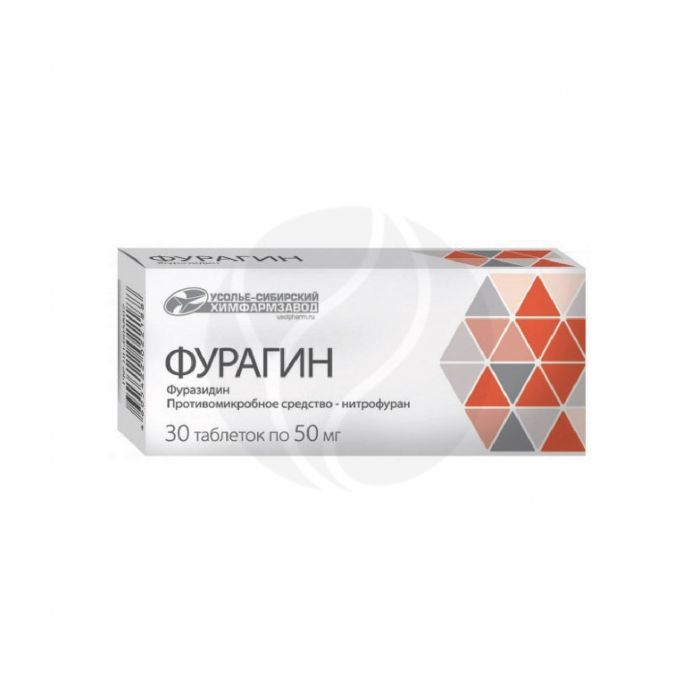Furagin tablets 50mg, No. 30
Expiration Date: 05/2027
Russian Pharmacy name:
Фурагин таблетки 50мг, №30
It is taken orally after meals. Adults - 50-100 mg 3 times / day, children over 3 years old - 25-50 mg (no more than 5 mg / kg of body weight) 3 times / day. The course of treatment is 7-10 days. If it is necessary to repeat the course of treatment, you should take a break for 10-15 days. For the prevention of infection (including during urological operations, cystoscopy, catheterization) - 50 mg once 30 minutes before the procedure.
Tablets from yellow to yellow with an orange tinge, flat-cylindrical shape.
1 tab. furazidine 50 mg
Chronic renal failure of severe degree;
pregnancy; lactation period (breastfeeding);
hypersensitivity to furazidine and other nitrofurans.
pharmachologic effect
Antimicrobial agent of a wide spectrum of action, belongs to the group of nitrofurans. The mechanism of action is associated with inhibition of nucleic acid synthesis. Under the influence of nitrofurans, the activity of the respiratory chain and the tricarboxylic acid cycle (Krebs cycle) is suppressed, as well as the suppression of other biochemical processes of microorganisms, which leads to the destruction of their membrane or cytoplasmic membrane.
Active against gram-positive cocci: Staphylococcus spp., Streptococcus spp .; gram-negative rods: Escherichia coli, Salmonella spp., Shigella spp., Klebsiella spp.
Resistant to furazidine: Pseudomonas aeruginosa, Enterococcus spp., Acinetobacter spp., Most strains of Proteus spp., Serratia spp.
Depending on the concentration, it has a bactericidal or bacteriostatic effect. Against most bacteria, the bacteriostatic concentration ranges from 10 to 20 ?g / ml. The bactericidal concentration is approximately 2 times higher.
Pharmacokinetics
After oral administration, furazidine is absorbed from the small intestine by passive diffusion. The absorption of nitrofurans from the distal segment of the small intestine exceeds the absorption from the proximal and medial segments by 2 and 4 times, respectively (should be taken into account when treating urogenital infections and gastrointestinal diseases, in particular chronic enteritis). Nitrofurans are poorly absorbed from the colon.
Cmax in blood plasma persists from 3 to 7 or 8 hours, in urine furazidine is detected after 3-4 hours.
In the body, furazidine is evenly distributed. Clinically important is the high content of the drug in the lymph (it delays the spread of infection through the lymphatic tract). In bile, its concentration is several times higher than in serum, and in cerebrospinal fluid it is several times lower than in serum. In saliva, the furazidine content is 30% of its serum concentration. The concentration of furazidine in the blood and tissues is relatively low, which is associated with its rapid release, while the concentration in the urine is much higher than in the blood.
It is metabolized to an insignificant extent (<10%).
It is excreted by the kidneys by glomerular filtration and tubular secretion (85%), partially undergoes reverse reabsorption in the tubules. At low concentrations of furazidine in urine, the process of filtration and secretion predominates, at high concentrations, secretion decreases and reabsorption increases. Furazidine, being a weak acid in acidic urine, does not dissociate, undergoes intensive reabsorption, which can increase the development of systemic side effects. With an alkaline reaction of urine, the excretion of furazidine increases.
With a decrease in renal excretory function, the metabolic rate increases.
Side effect
From the digestive system: rarely - nausea, vomiting, loss of appetite, liver dysfunction.
From the side of the central nervous system and peripheral nervous system: rarely - headache, dizziness, polyneuritis.
Allergic reactions: rarely - skin rash (including papular rash).
Application during pregnancy and lactation
The use of the drug during pregnancy and lactation (breastfeeding) is contraindicated.
Application for impaired renal function
Contraindicated in severe chronic renal failure.
Application in children
Contraindicated in children under 3 years of age.
special instructions
To reduce the likelihood of side effects, furazidine is taken with plenty of liquid.
If side effects appear, the use should be discontinued (toxic effects are more often manifested in patients with reduced renal excretory function).
During the period of treatment, the patient is advised to refrain from drinking alcohol, since side effects may increase.
Do not take a double dose to make up for a missed dose.
Use with caution in case of glucose-6-phosphate dehydrogenase deficiency.
Drug interactions
When furazidine is combined with ristomycin, chloramphenicol, sulfonamides, the risk of inhibition of hematopoiesis increases (should not be used simultaneously).
It is not recommended to use drugs that can acidify urine (including ascorbic acid, calcium chloride) simultaneously with nitrofurans.

